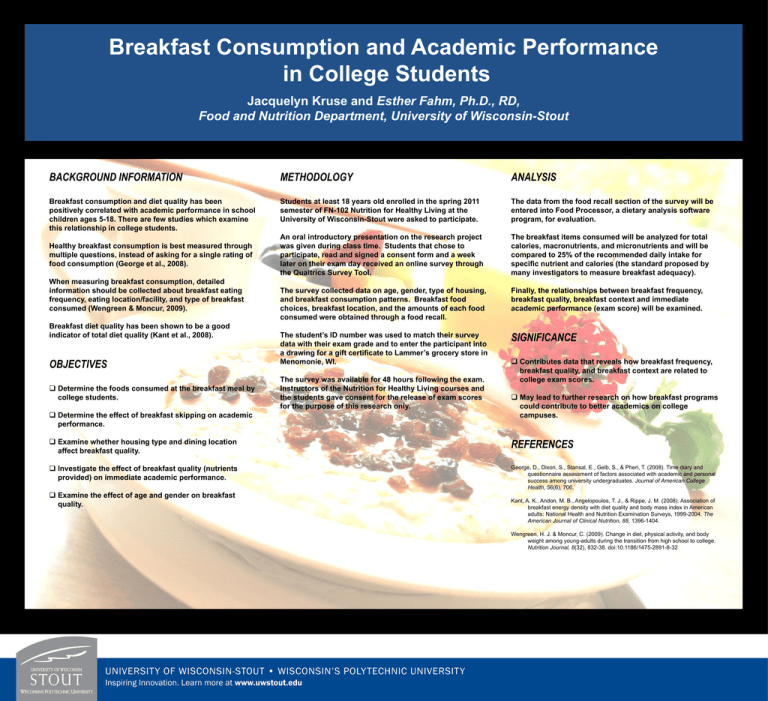NEW Final Research Day Poster
advertisement

Breakfast Consumption and Academic Performance in College Students Jacquelyn Kruse and Esther Fahm, Ph.D., RD, Food and Nutrition Department, University of Wisconsin-Stout BACKGROUND INFORMATION METHODOLOGY ANALYSIS Breakfast consumption and diet quality has been positively correlated with academic performance in school children ages 5-18. There are few studies which examine this relationship in college students. Students at least 18 years old enrolled in the spring 2011 semester of FN-102 Nutrition for Healthy Living at the University of Wisconsin-Stout were asked to participate. The data from the food recall section of the survey will be entered into Food Processor, a dietary analysis software program, for evaluation. An oral introductory presentation on the research project was given during class time. Students that chose to participate, read and signed a consent form and a week later on their exam day received an online survey through the Qualtrics Survey Tool. The breakfast items consumed will be analyzed for total calories, macronutrients, and micronutrients and will be compared to 25% of the recommended daily intake for specific nutrient and calories (the standard proposed by many investigators to measure breakfast adequacy). The survey collected data on age, gender, type of housing, and breakfast consumption patterns. Breakfast food choices, breakfast location, and the amounts of each food consumed were obtained through a food recall. Finally, the relationships between breakfast frequency, breakfast quality, breakfast context and immediate academic performance (exam score) will be examined. The student’s ID number was used to match their survey data with their exam grade and to enter the participant into a drawing for a gift certificate to Lammer’s grocery store in Menomonie, WI. SIGNIFICANCE Healthy breakfast consumption is best measured through multiple questions, instead of asking for a single rating of food consumption (George et al., 2008). When measuring breakfast consumption, detailed information should be collected about breakfast eating frequency, eating location/facility, and type of breakfast consumed (Wengreen & Moncur, 2009). Breakfast diet quality has been shown to be a good indicator of total diet quality (Kant et al., 2008). OBJECTIVES Determine the foods consumed at the breakfast meal by college students. Determine the effect of breakfast skipping on academic performance. The survey was available for 48 hours following the exam. Instructors of the Nutrition for Healthy Living courses and the students gave consent for the release of exam scores for the purpose of this research only. Contributes data that reveals how breakfast frequency, breakfast quality, and breakfast context are related to college exam scores. May lead to further research on how breakfast programs could contribute to better academics on college campuses. Examine whether housing type and dining location affect breakfast quality. REFERENCES Investigate the effect of breakfast quality (nutrients provided) on immediate academic performance. George, D., Dixon, S., Stansal, E., Gelb, S., & Pheri, T. (2008). Time diary and questionnaire assessment of factors associated with academic and personal success among university undergraduates. Journal of American College Health, 56(6), 706. Examine the effect of age and gender on breakfast quality. Kant, A. K., Andon, M. B., Angelopoulos, T. J., & Rippe, J. M. (2008). Association of breakfast energy density with diet quality and body mass index in American adults: National Health and Nutrition Examination Surveys, 1999-2004. The American Journal of Clinical Nutrition, 88, 1396-1404. Wengreen, H. J. & Moncur, C. (2009). Change in diet, physical activity, and body weight among young-adults during the transition from high school to college. Nutrition Journal, 8(32), 832-38. doi:10.1186/1475-2891-8-32











